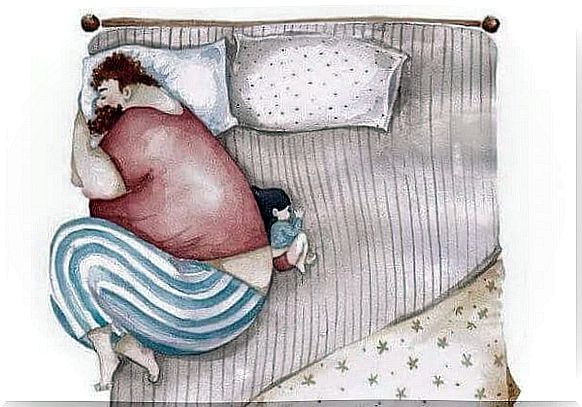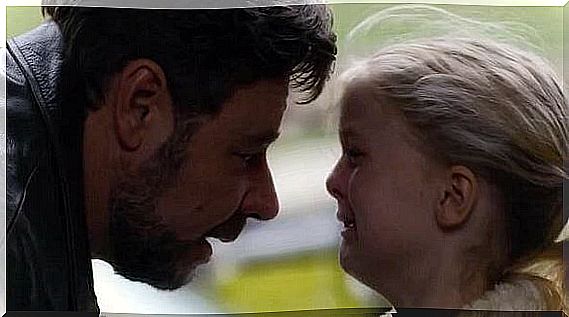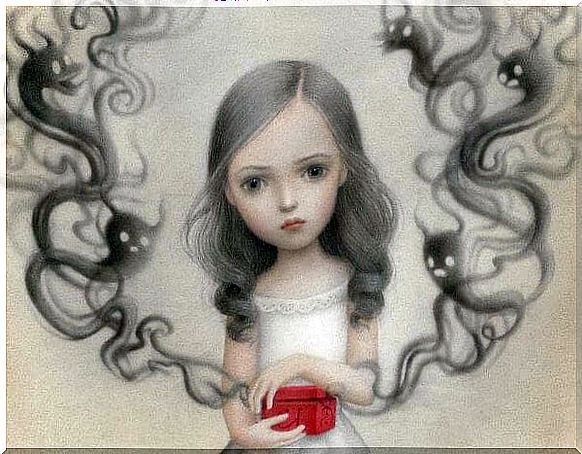Parents And Children: The Imprint Of Being Left By A Parent

The imprint left in a child after the experience of being abandoned by a parent leaves a great emotional void. This huge hole ends up isolating us, making us depressed and causing an emotional breakdown in our personal reality on all levels.
Thanks to decades of attachment studies, we know that healthy affective bonds guarantee the development of a fulfilling life filled with healthy relationships, healthy self-confidence and security and trust from others. On the other hand, insecure connections put us on a path to insecurity, low self-esteem and a lack of trust in those around us.
Negative affective bonds between parents and children create destructive behavior and great anxiety. Going through an introspection exercise and then distancing ourselves from this experience will help us to understand and work with it in order to achieve greater emotional freedom, and as a result organize our personality better (that is, our way of behaving with ourselves and our environment).
That is why, in this article, we will try to shed some light on this topic, to help redirect our emotional reality.

The difficulty of defining a parent and the relationship of being abandoned
It’s easier to talk about family relationships now than it used to be. But once you have dealt with an absent parent who left the family home for whatever reason, you must also fight against a definition of something that is indescribable.
Often in these cases, when someone is asked about their parents, they can just pinch, lower their gaze and respond weakly with apologies. This clearly shows the difficulty of defining the emotional vacuum and dealing with the scars left in us by being abandoned.
In this regard, we should mention that there are many ways to be abandoned. In fact, we can talk about as many ways as there are cases in the world. These are some of the most common:
- The emotionally absent but physically present parent. If we notice the socio-emotional reality in our environment, we will understand that this type of upbringing has been very common over the years.
- Parents who left us before, during and after childhood. The pain of being physically and emotionally abandoned at the choice of our reference characters is so significant from our process of growing up. It’s hard to deal with the reality you have to live with in this case. Because how do you assimilate the fact that someone who will follow you for many years of your life chooses to distance themselves from you in some way?
- Parents who left us physically or emotionally during our adolescence or adulthood. This type of abandonment will probably be labeled a betrayal. It must therefore be treated verbally with a lot of awareness.
- The almost total absence of a parent figure. In this case, there are several possibilities:
- Parents who died early and did not have the opportunity to play their part in our lives.
- Parents who died, but who we first knew. In this scenario, longing and idealization will create a characteristic gap.

Handling a damaged or destructive tape
Psychological treatment at both the emotional and mental levels is not only dependent on the child, but also on the whole environment. The shadow of an absent parent always bothers family life in one way or another. It is not easy to accept that our father, our ideal role model with our mother, does not remain in our lives. That is why his absence strongly influences our emotional development.
On the other hand, depending on our position in the family hierarchy, it is possible that other family members take on the role of parent through compassion or need; it may also be the case that we are the ones who feel the pressure to deal with certain matters.
The eternal question of what we consider to be a father also stands out; a common dilemma with complicated implications. The natural thing is that the emotional father is also the biological father, but as we can see, this is not always the case.

We should emphasize that we will acquire different qualities, tasks, obligations and roles that do not correspond to us, depending on the stage of development we are in and the circumstances. For example:
- If the parent figure is somehow lacking in our early childhood (0-6 years), it is difficult to achieve the emotional abundance needed at this stage, where we build the foundation for our Year growth.
- If the abandonment occurs in the second phase of childhood (6-12 years), the difficulty of consolidating the basis for healthy attachments will not be so strong (it will not be destroyed). Even in adolescence, a stage where it is important to have support, role models and clear boundaries, it is easy for the process of building a solid identity to be broken down.
- During childhood and adolescence, developmental stages where the personality is not yet structured, anxiety, sadness and pain of a loss will deeply mark our way of being and the way we relate in relation to the world.
- Put another way, this is the source of an inner disconnect, which naturally should not have happened. Therefore, it is a particularly traumatic experience that will mark us at the core and influence our way of connecting with others.
- When one is abandoned during adolescence or adulthood, the necessary process takes on different nuances, because parental absence and surrender create contradictions both internally and in the way of establishing relationships.
- It is common to be taken over by insecurity, mistrust and fear of betrayal. Because undeniable abandonment during adulthood is quickly processed as betrayal. In this case, we need to go through a much more conscious emotional analysis, and then we will feel the need to formulate it in words.
When we put it into words, the nuances of being left are more raw, because we no longer stun reality, and instead we probably make it even darker. In any case, our armor becomes even harder, and at the same time more fragile, which makes the process of rebuilding us even more complicated.
We know the secrets, we realize the reality and we know how to read between the lines, but we are never willing to let go of the idea of father as mentor, protector and hero.

Relieve the pain of living with the loss
Be aware that we did not say get over the loss, but rather live with it. You can get over the loss of your keys, or even our favorite toy, but getting over the loss of a parent is impossible.
It is important to understand this because if we try to convince ourselves that losing a parent will not affect us, we will build a castle in the clouds. It is completely unrealistic to think that something with so much emotional strain will not affect us in any way.
Treatment and management of the imprint of being abandoned by a parent requires forgiveness at both the individual and family levels, and this is not always easy to achieve. If our environment constantly punishes our father figure or if we see great pain in our mother, our siblings or our grandparents, we will probably project the same pain into ourselves.
Becoming aware of this in itself is progress, because we tend to separate the pain of others from ourselves. Obviously, the combination creates a cocktail that somehow makes us vulnerable forever.
But if we fight the bond of suffering and we consider each occurrence separately, we can gain a greater understanding of what has happened. This will help us stop storing the pain and feelings and continue to take easier steps along our emotional journey.








